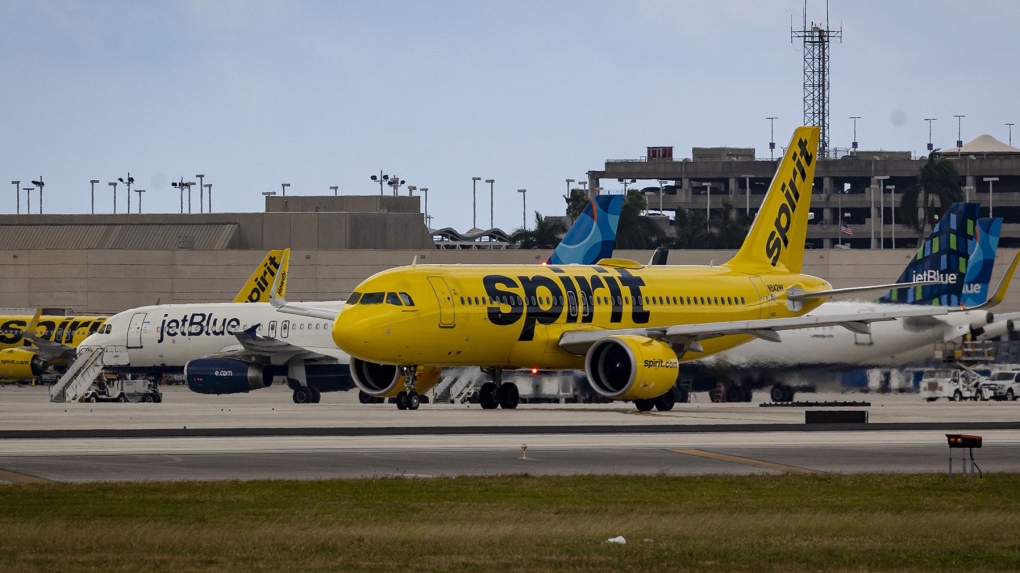New York –
Spirit Airlines could end up in bankruptcy and be forced out of business because of a federal court decision to block a proposed sale to JetBlue Airways, according to a note from an airline analyst.
Unlike many airline bankruptcies, in which the airline in bankruptcy court either sheds debt and emerges a financially healthier company or ends up being purchased by another carrier and merged into its operations, the more likely scenario for Spirit would be a liquidation of its assets, according to a note from Helane Becker, an analyst with Cowen.
“We recognize this sounds alarmist and harsh, but the reality is we believe there are limited scenarios that enable Spirit to restructure,” she wrote in a note to clients Wednesday. “We believe Spirit will first look for an alternative buyer, but another airline may get the same pushback [from antitrust regulators.]”
Spirit was a pioneer in offering ultra-low base fares in the U.S. market, but charging extra for virtually all other options, including carry-on bags. Its fares prompted major airlines to offer a certain number of no-frills “basic economy” seats on their planes. It also prompted concerns that its purchase by JetBlue would lead to higher fares across the industry — concerns which resulted in the Justice Department’s antitrust case that blocked the deal.
But if Becker is right, Spirit could still disappear. And if that happens it could lead to criticism of the Biden’s administration’s action to block the deal, and statements from Attorney General Merrick Garland and Transportation Secretary Pete Buttigieg praising the decision.
“After decades of airline consolidation, this ruling demonstrates the importance of putting competition first,” Buttigieg posted on X Wednesday. “This administration is holding the line on competition in order to support better consumer choice and lower airfares.”
All U.S. airlines were hemorrhaging billions during the first two years of the pandemic, despite receiving billions of dollars of federal assistance to keep flying and prevent widespread layoffs. But as demand for air travel bounced back in 2022, so did profitability at the larger carriers.
But smaller carriers — like Spirit — that offer lower fares to attract bargain-hunting leisure travellers have continued to struggle. Following US$1 billion in losses in 2020 and 2021, the company lost US$264 million in the first nine months of 2023. It is forecast to lose another US$175 million for the final three months of 2023, and an additional US$310 million in losses this year, according to analysts surveyed by Refinitiv.
Spirit has US$1.1 billion in debt coming due in September 2025. In a note Wednesday, Fitch said it will face challenges being able to refinance that debt.
“Spirit faces significant refinancing risk in the next year,” said the note from Fitch, which already had Spirit on watch from a downgrade from its current junk bond rating of B. “Meanwhile, the company faces serious headwinds toward improving its profitability including engine availability issues, overcapacity in certain leisure markets, and intense competition.”
Spirit did not directly comment on Becker’s analysis but said it is confident it will be able to survive the current problems.
“While we are disappointed with this [court decision] outcome, we are confident in our strengths and strategy,” said a company statement sent to CNN. “We remain committed to delivering affordable fares and great service to our guests and providing excellent opportunities to our team members. Spirit has been taking, and will continue to take, prudent steps to ensure the strength of its balance sheet and ongoing operations.”
The bankruptcy process is designed to allow money losing companies to shed debt and other expenses they can’t afford and remain in business. Many companies, including most of the nation’s major airlines, have gone bankrupt and went on to record profits in the future.
But Becker said it’s unlikely that Spirit will be able to renegotiate its deals, particularly with the aircraft leasing companies that own many of its planes, which are all single-aisle jets made by Airbus. With demand for those jets currently strong, the leasing companies that own the jets are much more inclined to simply repossess them from an airline that can’t pay, rather than negotiate with them on a lower price.
“Demand for narrowbody aircraft are at a premium, especially given ongoing issues at Boeing and lessors would be more likely to repossess aircraft than renegotiate leases,” she wrote. “In fact, JetBlue could lease in Spirit’s aircraft from lessors during the company’s likely restructuring.”
Shares of Spirit, which fell 47 per cent in trading on Tuesday following the court decision, lost another 22 per cent in trading Wednesday following Becker’s note and were down more than 25 per cent in trading Thursday. Combined that represents a 70 per cent drop in value so far this week.
In a decision announced Tuesday, Federal Judge William Young agreed with the Justice Department’s arguments that allowing JetBlue to purchase Spirit would violate antitrust laws and reduce downward pressure of fares that Spirit’s business model had brought to the US airline industry.
“The court has made its best attempt… to predict the future of a dynamic market recovering from the Covid-19 pandemic, in markedly uncertain times,” he wrote. “The proposed acquisition would eliminate Spirit as a competitor to all other airlines in the market, resulting in less pressure on all other airlines to compete.”
JetBlue and Spirit issued a joint statement following the decision saying they were considering whether or not to appeal the decision.
“We continue to believe that our combination is the best opportunity to increase much needed competition and choice by bringing low fares and great service to more customers in more markets while enhancing our ability to compete with the dominant U.S. carriers,” JetBlue and Spirit said in a joint emailed statement to CNN. “We are reviewing the court’s decision and are evaluating our next steps as part of the legal process.”







